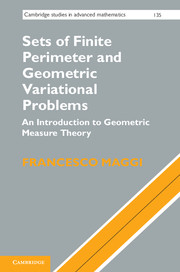 Sets of Finite Perimeter and Geometric Variational Problems
Sets of Finite Perimeter and Geometric Variational Problems Book contents
- Frontmatter
- Contents
- Preface
- Notation
- PART I RADON MEASURES ON ℝn
- PART II SETS OF FINITE PERIMETER
- PART III REGULARITY THEORY AND ANALYSIS OF SINGULARITIES
- 21 (Λ, r0)-perimeter minimizers
- 22 Excess and the height bound
- 23 The Lipschitz approximation theorem
- 24 The reverse Poincaré inequality
- 25 Harmonic approximation and excess improvement
- 26 Iteration, partial regularity, and singular sets
- 27 Higher regularity theorems
- 28 Analysis of singularities
- PART IV MINIMIZING CLUSTERS
- References
- Index
26 - Iteration, partial regularity, and singular sets
Published online by Cambridge University Press: 05 October 2012
- Frontmatter
- Contents
- Preface
- Notation
- PART I RADON MEASURES ON ℝn
- PART II SETS OF FINITE PERIMETER
- PART III REGULARITY THEORY AND ANALYSIS OF SINGULARITIES
- 21 (Λ, r0)-perimeter minimizers
- 22 Excess and the height bound
- 23 The Lipschitz approximation theorem
- 24 The reverse Poincaré inequality
- 25 Harmonic approximation and excess improvement
- 26 Iteration, partial regularity, and singular sets
- 27 Higher regularity theorems
- 28 Analysis of singularities
- PART IV MINIMIZING CLUSTERS
- References
- Index
Summary
We finally prove the C1,γ-regularity theorems for local perimeter minimizers (Theorem 26.1), as well as for (Λ, r0)-perimeter minimizers (with Λ > 0; see Theorem 26.3). In the first case we prove C1,γ-regularity for every γ ∈ (0, 1), while in the second case the presence of the perturbation term Λr in the key estimate (25.6) will force the restriction γ ∈ (0, 1/2). In view of the higher regularity theory, local perimeter minimizers will in turn prove to be smooth, and in fact analytic. Hence, the real advantage in treating the two cases separately is just pedagogical. In Theorem 26.5, we apply these regularity results to prove the C1,γ-regularity of the reduced boundary, together with an important characterization of singular sets. This last result will be the starting point for the analysis of singularities carried on in Chapter 28. As a first application of the characterization result, in Theorem 26.6, Section 26.4, we shall refine conclusion (i) of Theorem 21.14, by showing a sort of “C1-convergence at regular points”-theorem for sequences of (Λ, r0)-perimeter minimizers.
The C1,γ-regularity theorem in the case Λ = 0
We now prove the C1,γ-regularity theorem for local perimeter minimizers. As usual, in order to simplify the notation we shall set
Below, C1(n) is as in Theorem 23.7 (Lipschitz approximation theorem).
Theorem 26.1 (C1,γ-regularity theorem for local minimizers) For every γ ∈ (0, 1) there exist positive constants ε4(n, γ), C5(n, γ) with the following property.
- Type
- Chapter
- Information
- Sets of Finite Perimeter and Geometric Variational ProblemsAn Introduction to Geometric Measure Theory, pp. 345 - 356Publisher: Cambridge University PressPrint publication year: 2012


